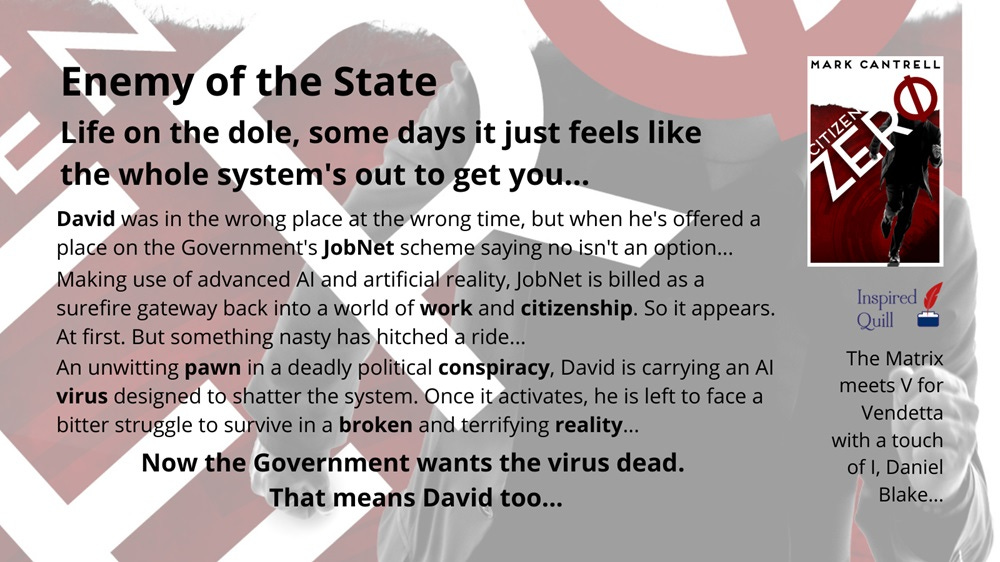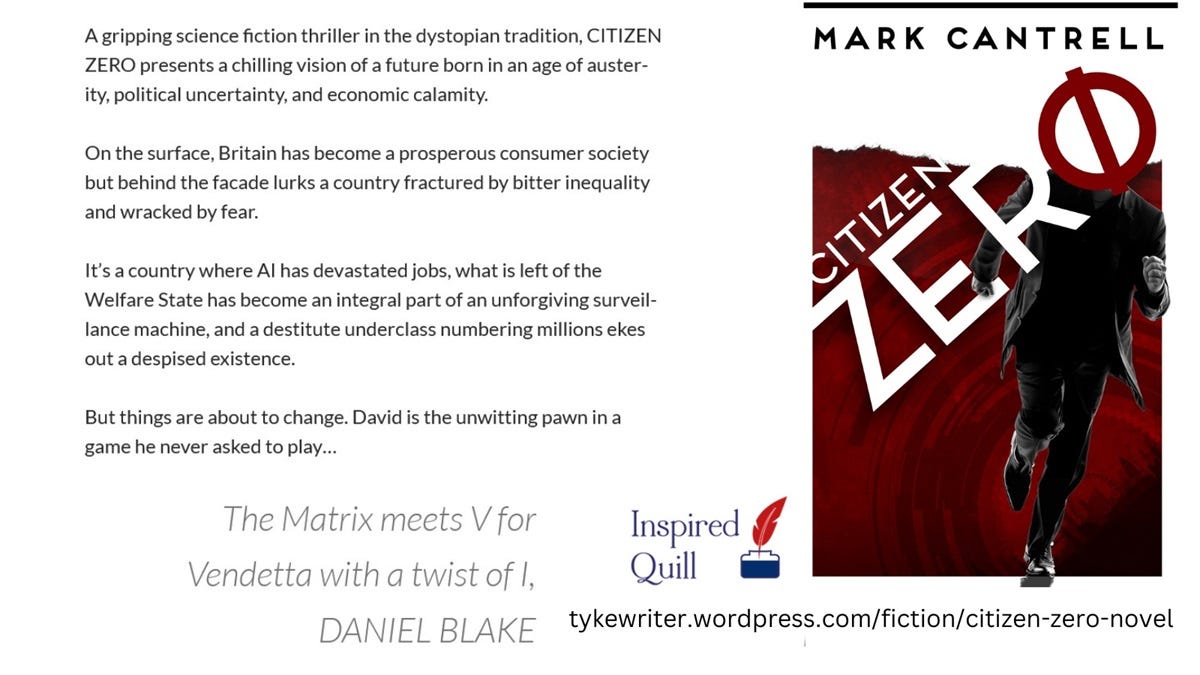Dystopian thriller straddles digital divide
Back when the future-shocker, Citizen Zero was born there was barely even an internet, let alone smartphones or social media, so it was time for an upgrade
A lot has changed since I first began to write Citizen Zero; yet in many ways things have remained much the same.
Indeed, in many respects – here in the UK, at least – we continue to live through the novel's real-world prequel. But that's not the focus here, so consider that a story for another time.
After the 2008 financial crash, the novel really started to come into its era. Then from 2010 onwards, the Coalition Government upped the ante with its welfare reform programme and austerity drive – but by then much of the everyday technology depicted in the story had dated badly.
No surprise, really. Every piece of fiction is a reflection of its time and Citizen Zero was no different. The novel was conceived way back in April 1994, when a fresh-faced recent graduate (that would be me) got an idea for a story about the metaphorical grotesqueries of life on the dole.
Before long, it grew a plot and something of a purpose. I was hooked. The novel and the 90s progressed in tandem. I played the sci-fi cards as the era dealt them, reflecting the emerging digital revolution in the story, but by early 2001 I’d signed off on my finished version of the manuscript – the digital revolution, meanwhile, continued apace. Indeed, even then, it had barely reached its stride.
Technology takes time
As it is, the focus of the novel’s speculation was elsewhere, so my second-guessing of the future inevitably went a little awry. My aim in all this was to present something with a contemporary feel, more or less, even as it reached into a then unspecified future. I didn’t want to stretch too far into the fanciful. Well, except in certain respects, as you’ll discover in the book.
These days, we take for granted our smartphones and apps, our high-speed broadband, our wifi and social networking. But a lot of this stuff is not much more than a decade old. The internet as we know it is a not yet out of its 20s, even if at times it does feel a bit granddad.
Citizen Zero pretty much straddles this digital age. When I started writing the novel there was no internet. Okay, so that’s poetic licence. Yes, there was an internet, but it was only just on the verge of breaking out of its specialist niches to become a mass public phenomenon.
In 1994, social media didn’t exist. There was no Facebook or Twitter (X, if you reall must), no SnapChat or WhatsApp. No Uber, iTunes or Netflix. Amazon was just a region and a river in South America. Hell, there wasn’t even MySpace.
The launch of the first graphical web browser – Netscape Navigator – appeared in late 1994 and began to open up the emergent world wide web to non-technical users. Microsoft dived in with its first iteration of Internet Explorer and, well, the rest is history. The web became a thing… and we haven’t looked back.
Back when Citizen Zero was conceived, a modem dialled you into your ISP via the (fixed landline) phone, which played havoc if anybody wanted to make a call. Screens were clunky vacuum tubes in a box, and 3.5in floppy disks were the storage medium of convenience. (I’ve still got some of the old floppies with early drafts of the novel on them; no, they’re not readable.)
As for mobile phones, well they became commonplace as the Millennium became the Noughties, but these little gadgets were still just a phone. Sure you could send a text and take pictures; if you were a bit weird you could even ring people up and talk to them, but you couldn’t look up train times, or find the nearest restaurant or pub.
Looking back, I’d say it’s only really the last decade or so where the everyday tech in Citizen Zero began to look a little out of date. Certainly, when the novel was picked up for the launch list of a new publisher (that failed to get off the ground in the end), anachronism never really cropped up as an issue during the editing process.
But that was before Apple launched its first iPhone and ushered in the tech culture we know today. It’s barely 15 years since tablet computing, wifi networking and mobile telephony melded into the smartphone age, which rather puts into perspective the shifts in technology that have gone on since Citizen Zero came into being.
Beware the nexus
Naturally, I was aware of the technological shifts, in a detached and abstract kind of way, but it was only when I was going through my editors’ comments that it really hit home. Boy, did I feel old. Here’s the comment that effectively triggered this bout of nostalgic reminiscence:
“Not sure if this was intentional, but I immediately thought of the Google Nexus phones here – and the whole ‘Google is watching you’ thing is a nice lead-on from that.”
Obviously, Google and Nexus smartphones were the last things on my mind when I wrote said passage. Indeed, there was no Google.
Just so you know, the comment refers to the smart card the protagonist carries. It's a payment card, messaging device, and tracking system all in one. It’s not Google that’s watching you, here, but the future equivalent of the Department of Work and Pensions. It's called Nexus40. For those old enough to remember, think of it as a kind of UB40 signing-on card – but with added attitude.
Yes, it’s basically an electronic tag; they know where you are, where you’ve been, what you’ve bought, who you’ve been to see, and it signals the surveillance grid so they can always keep a CCTV eye on you…
It could have been a phone, even back then. I think I briefly toyed with Nexus being on a phone. Maybe it even should have been one, but given the themes of the novel, it seemed essential to have a separate device. A card loaded with benefit payments fits the welfare agenda; a device not hidden away on a phone, but something specific, something that is almost custom-made to advertise stigma each and every time it’s pulled out of a pocket and used. An ‘app’ on a phone would be too discrete.
Despite the novel’s tech-thriller aspects, I have to say it was never really a novel about the digital revolution. Technology was in the backseat; social comment was at the wheel, as I sought to tell a story about the role social security (welfare) could be made to play in the creation of an authoritarian surveillance society.
Back then, before the advent of a certain reality television programme, we still spoke of Big Brother in the context of something sinister (rather than a source of dubious entertainment). Indeed, that’s how I saw Citizen Zero, as part of an Orwellian dystopian tradition.
Inevitably, this is likely to put some people off. I knew it then, I know it now. It’s the nature of the beast. The gritty concepts at play in the novel make Citizen Zero something of a hard sell, but I was conscious of my desire to make a point or three and generate a thought-provoking read. Of course, I wanted to tell a gripping story too. Hopefully, I’ve achieved that aim. You be the judge.

New beginning
In August 2017, a brand-new edition of Citizen Zero out (has it really been so long, t feels like only yesterday). In this edition from Inspired Quill, we seized the opportunity to upgrade the technological depiction: to bring much of the everyday tech into the 21st Century and embrace a new contemporary.
Social justice remain at the forefront, however: Citizen Zero remains an exploration of the hubris of power (and a faith in technology), the consequences of allowing bitter inequality to flourish as a deliberate political tool, and the enduring quality of the human spirit to rise from the wreckage of cruel circumstance.
The world turns; we turn with it. But we’re still living in the novel’s real life prequel, as I often find myself saying. Some things never change, only come into their own. Here in the UK, we’re all potentially Citizen Zero these days.
Oh yeah, and here’s one final tech confession to finish things off: I wrote a big chunk of the original draft on an Atari ST. Don’t know what that is? Google it!
MC





